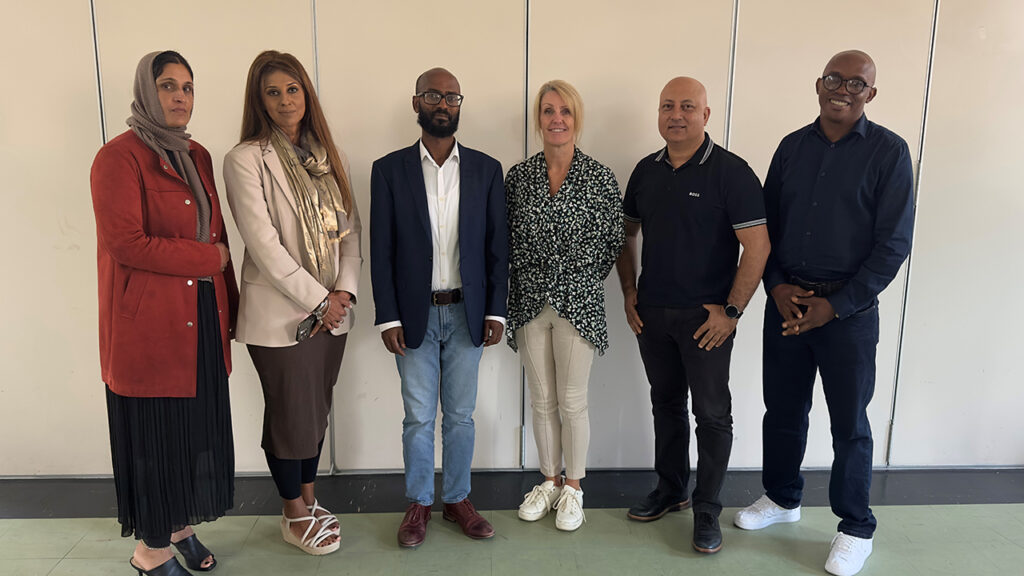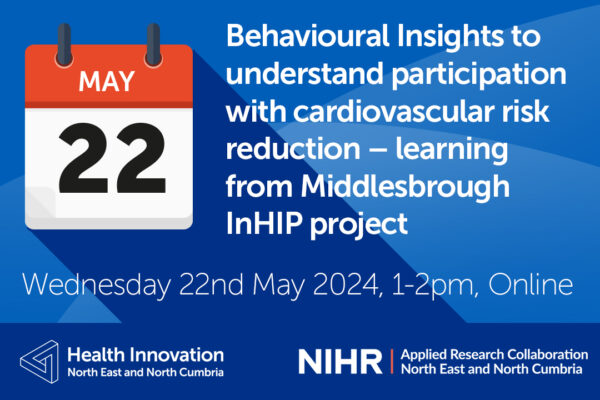Innovation for Healthcare Inequalities Programme (InHIP)
The Innovation for Healthcare Inequalities Programme (InHIP) was a national programme which came to an end in April 2024.
HI NENC led on the programme within the North East and North Cumbria, working with partners in the region to address local healthcare inequalities experienced by deprived and underserved populations. More information, including an evaluation of work so far, can be found below.
A second wave of InHIP activity is due to launch in September 2024 and HI NENC is currently undergoing a scoping exercise to shape future work.
Programme Overview
InHIP is a unique collaboration between the Accelerated Access Collaborative (AAC), NHS England’s National Healthcare Inequalities Improvement Programme and England’s 15 Health Innovation Networks (HINs) and delivered in partnership with Integrated Care Systems (ICSs).
Health inequalities are unfair and avoidable differences in health across the population, and between different groups within society. These include how long people are likely to live, the health conditions they may experience and the care that is available to them.
Some groups in society – particularly the socially excluded, those living in areas of high deprivation, and those from Black, Asian and minority ethnic communities – can experience extreme differences, especially people who are in more than one of these seldom listened-to groups
You can read about how the programme aims to address these inequalities on NHS England’s website.
Activity in the North East and North Cumbria Region
The North East and North Cumbria region has the lowest healthy life expectancy and highest health inequalities in England with Middlesbrough having one of the lowest life expectancies in England. In terms of Cardiovascular Disease (CVD), Middlesbrough has the highest mortality rate in the North East and is the 11th highest nationally.
In response to this, HI NENC collaborated with system partners to address healthcare inequity by delivering a pilot project that aimed to increase the uptake of health checks within communities at the highest risk of CVD mortality.
As part of the InHIP programme, HI NENC gathered behavioural insights from targeted Core20Plus5 populations, to understand the barriers and challenges they face when accessing heart health checks locally. Focus group interviews highlighted several key themes, including difficulties accessing healthcare from their GP due to language barriers, varying levels of health literacy, and the need for gender-appropriate services.
The insights from this research informed the co-design of heart health checks tailored to the needs of local communities, empowering them to take ownership of their health. The findings were discussed with community leaders in Middlesbrough in this video, led by Dr Joe Chidanyika.
These health checks were delivered in community locations, such as places of worship and community hubs. The checks included a cholesterol check using PocDoc’s innovative cholesterol test, blood pressure, height and weight checks.
Project evaluation
Heart health checks were delivered to approximately 500 people from underserved communities including Afro-Caribbean, African and South Asian communities. Over 60% tested had an abnormal result and were referred to their GP for a lipid medication review.
To ensure the sustainability of these outreach services, the InHIP project engaged commissioners from public health in Middlesbrough in the co-design of the heart health checks. This research has been timely, coinciding with reviews of public health services to enhance their effectiveness and reach all communities within the population they serve. A debrief video was filmed about how the behavioural insights were incorporated into the pilot heart health programme. Watch the video.
An impact report was produced in May 2024 detailing the programme scoping, delivery, local impact and sustainability of the project.
Key partners included:
- NHS England
- Health Innovation Network National InHIP Team
- ICS NENC Team
- NHSE NEY Regional Team
- Middlesbrough Locality (Middlesbrough Council, Community Leaders, BAME network)
- NIHR Applied Research Collaborative, NENC

“Co-designing the initiative and understanding what the community needs are, and then implementing the initiatives in partnerships with the Mosques and community centres enabled it to be successful because people had ownership and buy in from the onset.” Idrees Rashid – Managing Director at BME Network
For further information, please contact Mark Henderson.
Videos
Behavioural insights debrief
In this video, Dr Joe Chidanyika, CVD Programme Manager for Health Innovation North East and North Cumbria (HI NENC), leads a follow-up with community leaders, who enabled access to the focus groups, discussing how the study findings can now be co-designed into tangible pilot interventions, to increase heart health checks for Black-Africans, South Asians and the indigenous underserved white population groups in Middlesbrough.
Programme debrief – following six month pilot
In this debrief video, Dr Joe Chidanyika, CVD Programme Manager for Health Innovation North East and North Cumbria (HI NENC), leads a discussion with community leaders about how insights from behavioural insights work have been incorporated into a pilot heart health programme in Middlesbrough. They discuss the programme, the impact on underserved groups to meet local need, and the next steps.
South Tees Heart Health leaflet
This leaflet was developed as a handout to people who attended a health check appointment. It provides an opportunity to record results of the tests and provides public health information about the tests and health risk factors, including exercise, diet, smoking and alcohol. Download the leaflet.
Key principles when gathering Behavioural Insights

Describing the key principles of behavioural insights, why they are important and how understanding them can improve the care we provide.
Behavioural Insights to understand participation with cardiovascular risk reduction – learning from Middlesbrough InHIP project

BI to understand participation with cardiovascular risk reduction
Heart health checks offered in the community to reduce risk of ‘silent killer’

People from across Middlesbrough have benefited from heart health checks on offer at recent events in the town. Two drop-in clinics were held where people could undertake a series of short tests to assess their risk of developing cardiovascular disease…
